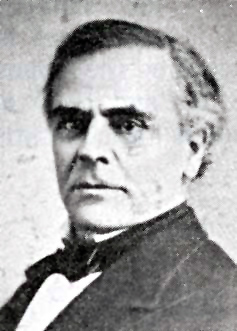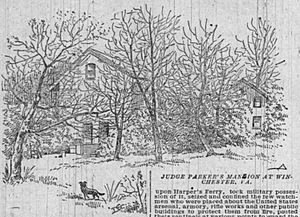Richard Parker (congressman) facts for kids
Quick facts for kids
Richard Parker
|
|
|---|---|
 |
|
| Born | December 22, 1810 |
| Died | November 10, 1893 (aged 82) |
| Resting place | Mount Hebron Cemetery, Winchester |
| Alma mater | University of Virginia |
| Occupation | Lawyer, judge, politician |
| Known for | Presiding over John Brown's trial |
| Spouse(s) | Evalina Tucker Moss |
| Parent(s) |
|
Richard Parker (born December 22, 1810 – died November 10, 1893) was an important person in Virginia during the 1800s. He worked as a lawyer, a judge, and a politician.
Contents
Early Life and Education
Richard Parker was born in Richmond, Virginia. His father, Richard E. Parker, was also a judge and a senator. Young Richard went to the University of Virginia to study law. After finishing his studies, he became a lawyer. He started his law practice in Berryville, Virginia, which is close to Winchester, Virginia. He lived in Winchester for most of his life.
Career as a Public Servant
Before becoming a judge, Richard Parker held several local jobs. He also worked as a paymaster at the Harpers Ferry Armory. In 1848, he was elected to the United States House of Representatives as a member of the Democratic Party. He served in Congress from 1849 to 1851.
On January 15, 1851, Parker was chosen to be a judge for the thirteenth judicial circuit in Virginia. A circuit court is a type of court that hears cases in different locations or "circuits."
The John Brown Trial
One of the most famous cases Judge Parker oversaw was the trial of John Brown in 1859. John Brown and his group, known as John Brown's raiders, had led a raid on Harpers Ferry. This event was a major moment before the American Civil War. Judge Parker sentenced John Brown and his associates to death for their actions. In 1888, Judge Parker wrote about his memories of this important trial.
Later Life and Family
Judge Parker left the court in 1869. This was when the Union Army, which was in charge of Virginia after the Civil War, temporarily closed the courts. He then went back to working as a lawyer in Winchester, Virginia. He continued to practice law until he passed away on November 10, 1893. Richard Parker was buried in Mount Hebron Cemetery in Winchester.
Richard Parker was married to Evalina Tucker Moss. They did not have any children. One of Parker's enslaved workers, Presley Dunwood, who drove his carriage to court during the John Brown trial, later wrote down his own memories.
Images for kids
 | James Van Der Zee |
 | Alma Thomas |
 | Ellis Wilson |
 | Margaret Taylor-Burroughs |



